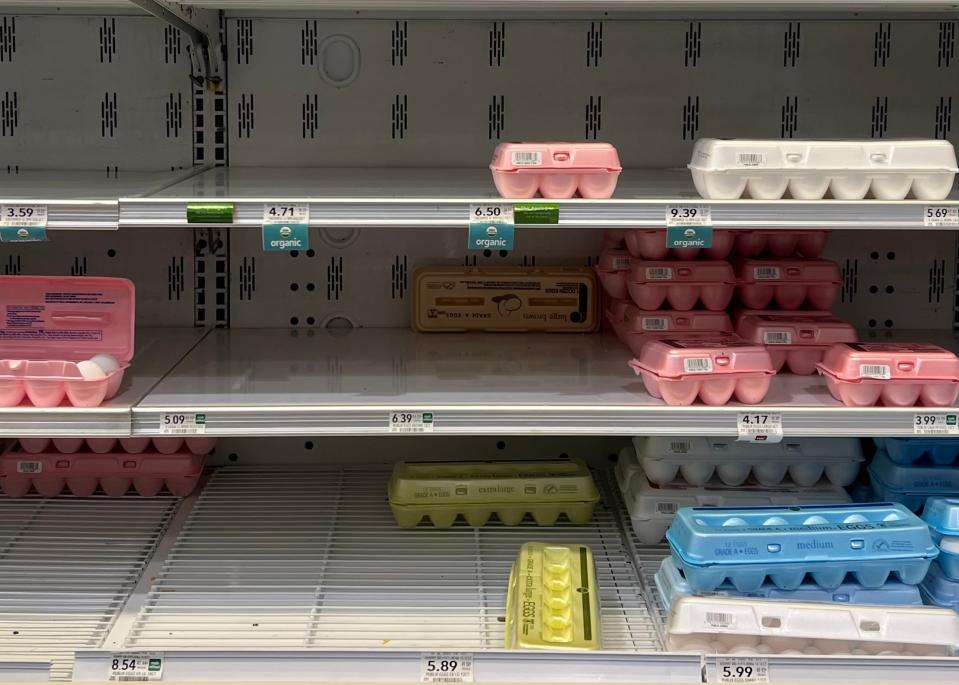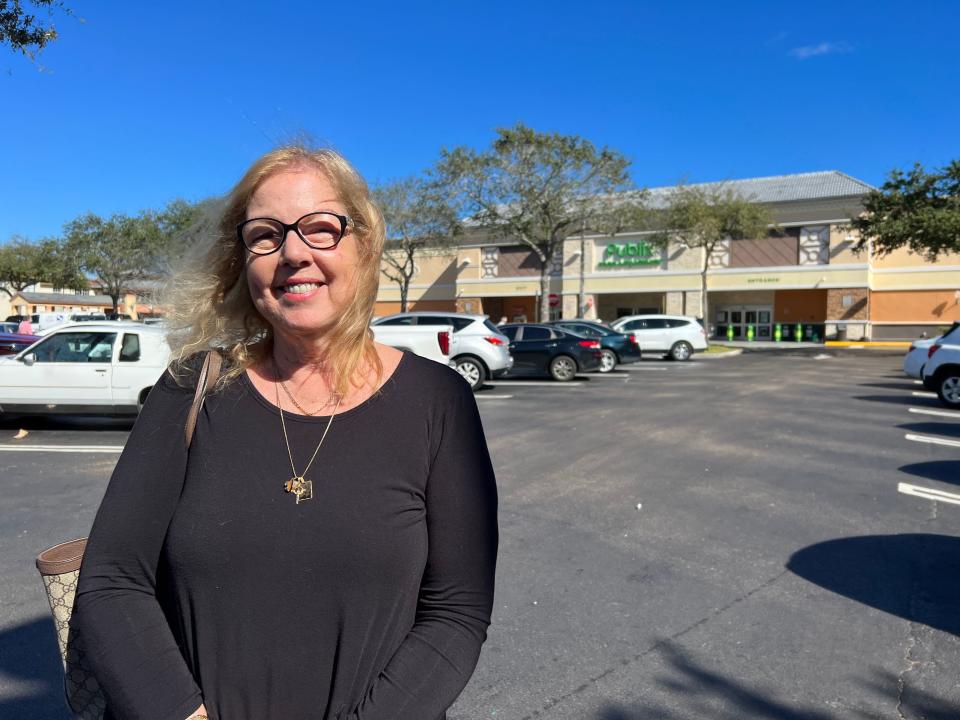Inflation: How much more are you spending for that breakfast these days?
Consumer reporter Hannah Morse explores how price increases are impacting our daily lives, from shopping to entertainment to meals and more.
The breakfast quiche at Lisa Cavanagh’s home was once a welcome part of her weekend routine.
But these days, the savory medley of ham, tomatoes, hashbrowns and, most crucial, fluffy eggs is more like a delicacy.
“Eggs are crazy expensive,” Cavanagh said after a recent trip to Publix in Boynton Beach. “I make less things that require a lot of eggs.”
A dollar today doesn’t go as far as it once did even a year ago, influencing to varying degrees how consumers spend their money across all facets of life.
Breakfast is no exception.
On the menu this Thanksgiving: On the menu this Thanksgiving: Turkey, with a side of inflation
Super Saturday:Despite inflation, shoppers strive to make the holidays special
FPL:Brace yourself for bills to increase at least thrice in 2023
Egg prices across the U.S. up by almost 60% in the last year
The cost hikes are painstakingly documented in government surveys. Egg prices across the United States, for instance, went up by almost 60% in the last year, the latest Bureau of Labor Statistics’ Consumer Price Index said.
But the changes are visible before our very eyes, our receipts, and our wallets.
Publix, for one, currently sells a 30-count tray of eggs for $13.03, an 18-egg carton for $8.40, a dozen for $6 and $4.17 for a half-dozen. Down the street at Walmart, shoppers can save a buck or two with a dozen eggs going for $4.64 and an 18-count for $6.91.

Say you’re seeking out the classic breakfast essentials at once at Publix. Sans coupons, you could look at your cost two ways: either by the overall lowest sticker price on the product or the lowest unit price on each item.
While the lowest sticker price will help you stay within the budget during a shopping trip, the unit price — the number in the corner of the shelf label that breaks down the cost per weight or number in the package — might not mean immediate savings, but rather savings over the long term.
But, for simplicities’ sake, let’s use the sticker price.
On this list: eggs, bacon, bread, coffee, orange juice, milk and cereal.
Depending on your needs, eggs will run you between $4 and $13. Add in a 12- or 16-ounce package of bacon at $9.99 or $5.29, respectively, whether it’s Black Label or Publix brand. A loaf of Publix’s white enriched bread sells for $2.39 and the fresh bakery bread costs roughly $4.39.
Coffee choice is definitely a matter of taste. A 12-ounce bag of Starbucks coffee went for $11.99, but Canada’s own Tim Hortons went for a deal at $7.99. On the other end, specialty brands like Death Wish, which calls itself the “World’s Strongest Coffee,” can run you $19.99 a bag.
A 1.6 quart of Tropicana orange juice, less than a half gallon, was $4.79, but Publix’s brands had offerings at either end of the spectrum, $3.79 for a half gallon from concentrate or $5.49 for its Greenwise organic option.
Milk was $4.95 for a gallon of the store’s brand, or $7.19 for organic. And cereal went for $2.40 for certain Publix brands like Bran Flakes or Almonds & Oats, or $7.09 for a “Giant Size” of Honey Bunches of Oats.
The total? Anywhere between $30.98 and $67.17.
It’s a rarity that Peggy Tomasino was even shopping at Publix, with Aldi, Walmart and Costco higher in her rotation because of their cheaper prices. But that Tuesday in mid-January, she needed specific ingredients for a chicken soup and the grocer was closest by.
While Tomasino doesn’t necessarily bill herself as a “breakfast person,” she usually keeps some eggs at home at all times. She refrained from restocking this time, though.
“Normally if I only had a few left, I’d be buying another dozen eggs,” she said while loading the trunk of her car. “Guess what? I didn’t buy them because I couldn’t bring myself to spend $7 on a dozen eggs.”

Despite soaring egg prices making headlines across the country, that product wasn’t the most costly breakfast item for Cavanagh.
This trip, she said “no” to English muffins. The Thomas brand goes for $5.29, roughly $2 more than it used to be, she said. But since cereal is one of her typical breakfast purchases, she grabbed a box of Wheat Chex for $5.
Aside from the Publix brands, it was tough to find anything cheaper than that, she said.
“I just think that eating at home is still more cost-effective. I don’t not buy what I know that we will eat, but maybe I just don’t buy as much of it,” she said.
When planning for meals, Cavanagh forgoes the list and lets Publix decide. She’ll seek out BOGO deals, where you purchase an item and you get a second free item, too, “even if it’s stuff I don’t love, just because you get more for your money.”
“I kind of base my meals around what the cost is, rather than writing a list and knowing what I’m going to get,” she said, noting she took advantage of the sale on meatballs that day. “I wait until I get to the store to see what is a good buy.”
At a nearby Walmart, Iza Gonzalez finished her shopping trip with a carton of eggs in tow.
“I think I try to keep buying what I usually buy,” she said. “I just try to go to different places to get a better price.”
Like others, she’s keenly aware of price increases, not only with groceries but with entertainment and insurance, too.
Frank Ventura, just a few lanes away in the parking lot, said he has noticed the cost of his breakfast going up, particularly for Cheerios and the Coffee-Mate for his cup of joe.
But that hasn't stopped him from buying his essentials, and doesn't have him scouring several stores to get the best price.
"I don't pay any attention. I buy it and that's it. Do we have a choice?" he said. "It'll cost me more gas to shop around."
While some might not pay too much mind to what goes into their shopping cart, others are doing more mental math and changing their habits.
“It makes you stop and think of what you need to buy and what you don’t need,” Tomasino added. “You stick with your priorities.”
This story is part of an occasional series that explores how price increases are impacting our daily lives, from shopping to entertainment to meals and more. If there is a category of your spending that has been impacted by price increases, no matter how small or large, reach out to Palm Beach Post consumer reporter Hannah Morse at hmorse@pbpost.com or 561-820-4833. Follow her on Twitter @mannahhorse.
This article originally appeared on Palm Beach Post: Eggs cost how much? Prices in the U.S. up by almost 60% in last year

